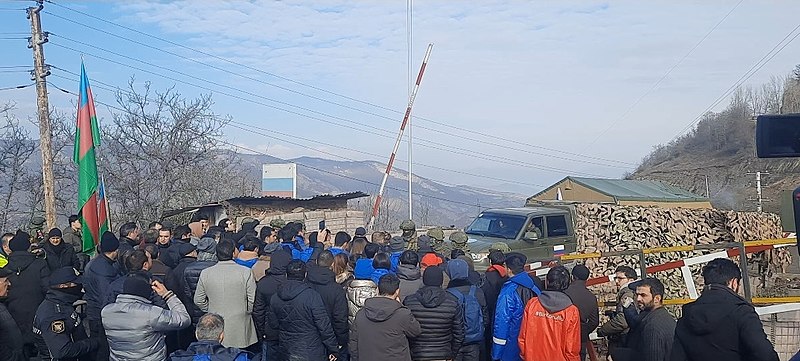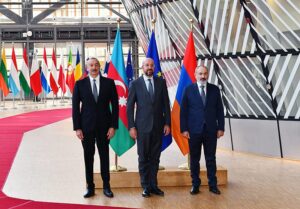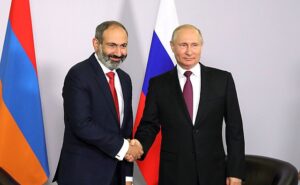Photo: Azerbaijani protesters during the 2022 blockade of the Lachin corridor (Wikimedia Commons)
The only road connecting Nagorno-Karabakh region to Armenia, the ‘Lachin corridor’ has been blocked by Azerbaijani protestors since December 12, depriving tens of thousands of Armenians living in the region of vital goods and services. People cannot leave or enter Nagorno-Karabakh – which is now mostly under Azerbaijani control after a deadly 2020 war with Armenia. Ever since, a two-thousand-man-strong contingent of Russian peacekeepers attempts to uphold a fragile ceasefire in the region. On December 20th, UN Security Council univocally condemned the Azerbaijani blockade – urging an immediate re-opening of the vital road.
Azerbaijani environmental protesters
Dozens of Azerbaijani environmental protesters have been blocking the Lachin corridor around the clock. They say to protest illegal exploitation of minerals in the region by Armenian authorities, and the environmental impact of such mining. Armenian authorities, among others, accuse Baku of staging the protests to cause unrest among the Russian peacekeeping contingency and overall peace process between Armenia and Azerbaijan. Azerbaijani-instigated protests rarely occur without the consent of its governmental authorities.
Armenia exports around 400 tons of essential goods to Nagorno-Karabakh each day. As the blockade endures, it could have extensive humanitarian consequences. Moreover, gas supplies trough an Armenian pipeline that runs through Azerbaijani-held areas stopped on December 13, causing schools to close due to cold weather. The delivery of gas resumed on December 16.
“Guaranteed free and safe traffic”
Armenia and Azerbaijan have been fighting over Nagorno-Karabakh for decades. It has become a key factor of animosity between the neighbours after the dissolution of the Soviet Union. The enclave is mostly populated by ethnic Armenians that gained de facto control over the region after a 1994 war. During a six-week war in 2020, Azerbaijan re-gained many territories from Armenia, such as the district surrounding the Lachin corridor. A November 2020 Russian-brokered ceasefire called for safe and free movement through the Lachin corridor by Armenian cargo, people, and vehicles at all times – being enforced by Russian peacekeepers. Ever since, Azerbaijani and Armenian negotiators attempt to conclude a peace treaty that should fully end hostilities in the region.
Waning Russian influence in the South Caucasus
For now, this peace process has not passed without its hurdles. As Armenia’s political leadership struggles with many conditions in proposed peace treaty provisions, Azerbaijan has used its post-2020 military advantage to enforce its geopolitical prevalence in the region. Highly controversially, Azerbaijani troops entered Armenia sovereign territory last September, shelling villages, and causing hundreds of casualties.
In these clear violations of the Russian-brokered ceasefire, Armenian authorities desperately reach out to the Russian peacekeeping contingency to restore order in the region. These seem unable and unwilling to do so. Russia’s military capacities are fully targeted on its military invasion of Ukraine. But more importantly – disorder and hostilities in the region favour the Kremlin as it legitimizes a continuation of a paternalistic-style Russian presence in the region as a ‘guarantor’ of stability.
In this apparent power vacuum, the EU and US have been trying to join efforts in mediating in the conflict. Lately, the EU deployed a civilian monitoring mission on the Armenian-Azerbaijani border. While these western actors are an interesting option for Armenia and Azerbaijan to re-route the peace process from the erratic Russian presence in the region, the Armenian military and economic dependence on Russia leaves the Kremlin as the most important actor for now.
In essence, the blockade of the Lachin Corridor thus provides a new chapter in the unrest regarding Nagorno-Karabakh, Armenia, and Azerbaijan. As Russia’s geopolitical presence is waning in its adjacent regions such as the Southern Caucasus, more hostilities and unrest can be expected in the region until a fully respected peace treaty is reached. For now, Azerbaijani authorities should immediately facilitate the re-opening of the Lachin corridor to prevent humanitarian tragedy in Nagorno-Karabakh.
Sources: Human Rights Watch JAM News Radio Free Europe Eurasianet
Photo: Wikimedia Commons



